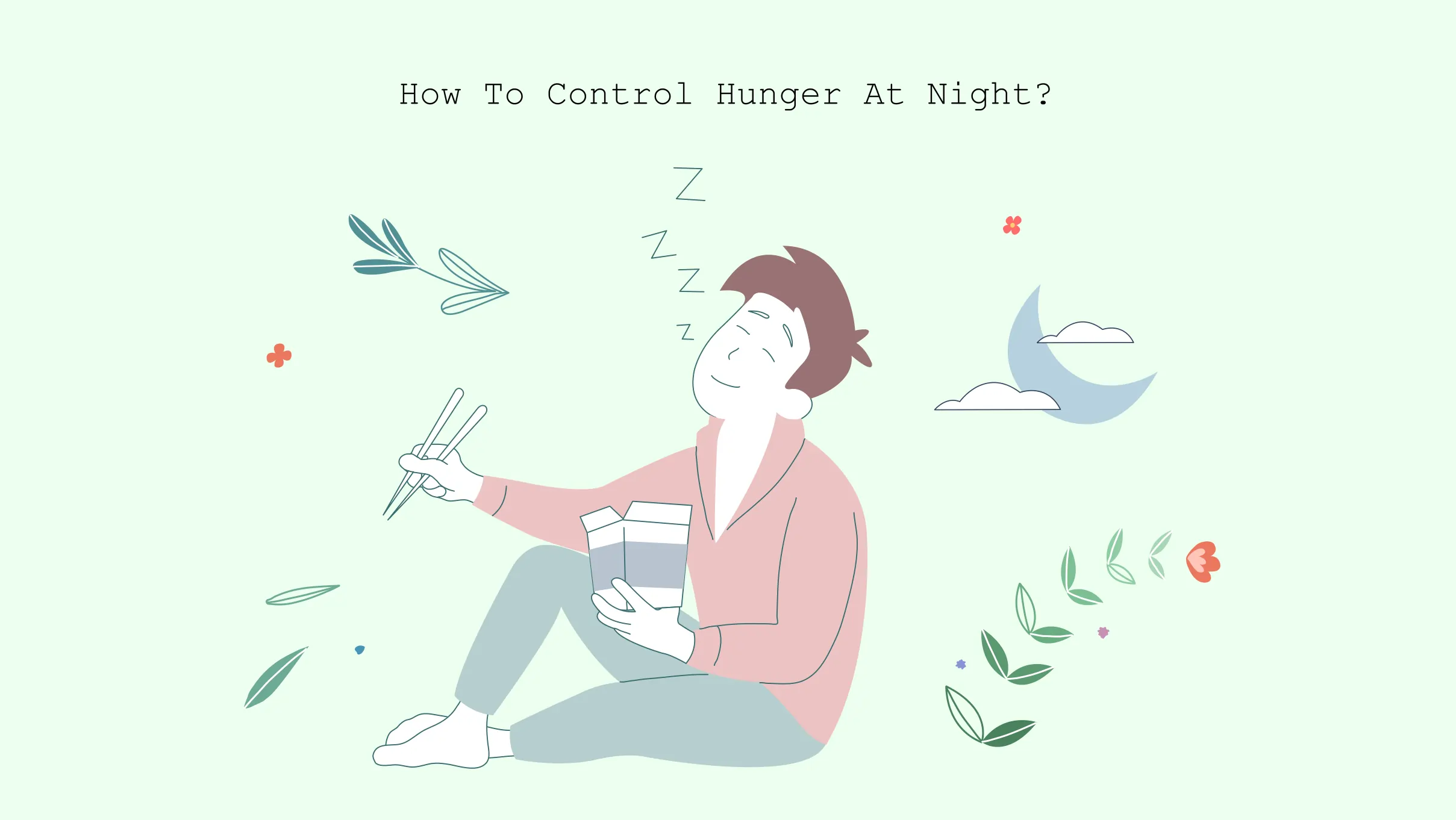10 Ways to Control Hunger at Night
Written by


Table Of Content
Do you often sneak into the kitchen during midnights? Are Zomato or Swiggy your regular visitors during late nights? If the answer is YES, then you are probably unable to control your hunger at night.
Though gulping on ‘Golgappa’, ‘Bhelpuri’, pizzas, burgers, and ice-creams, might be really fulfilling. Nighttime eating is a cause of depression, obesity, and sleep issues. Here are 10 ways to control hunger at night.
Keep a Food Journal
Just like you journal to pen down your thoughts and emotions, keeping a food journal will help you keep a tab of the foods you consume. The edge of maintaining a food journal is that you can notice when you are undergoing stressful eating. The stress hormones in the body urge people to consume more sugary and high-fat food, eventually leading to weight gain.
In fact, a study conducted on 17 people showed how indulging in an online self-help program has reduced their binge eating problem. The Play Store is filled with fitness and healthy eating apps, choose the one you like and get going.
Schedule Your Meals and Snacks
Routines are not only practical for studying or sleeping but also for eating. Scheduling your meals and snacks ahead of time doesn’t give you much space to indulge in mindless eating. Start by structuring your meals. For instance, breakfast needs to be consumed within two hours of waking up to increase metabolism. There needs to be around four to five hours between lunch and dinner.
Although munching on a healthy snack between breakfast, lunch, and dinner is fine. Greek yoghurt, fruits, and fox nuts are some healthy snacks that might alleviate your weight loss journey.
Get Enough Sleep
Are you sleep-deprived? If yes, you might already binge eat since both are connected. It doesn’t end here; binge eating might also cause insomnia, and shorter sleeping hours might cause an increase in ghrelin levels, the hunger hormone.
There is nothing like a sound sleep of 7 to 9 hours, and waking up all fresh. Therefore, engage in a soothing nighttime routine that involves listening to music, journaling, practising yoga, and additional activities aiding you to sleep.
Eat Regularly Throughout the Day
Skipping meals or taking long breaks can aggravate your health, leading to increased hunger at night. A study conducted over 2 months stated that people who consumed a single heavy meal in a day experienced a rise in blood sugar and ghrelin compared to those who consumed three meals a day. Another study showed that 38 people who indulged in regular eating throughout the day has resulted in decreased eating.
Incorporate Protein at Every Meal
Protein acts as a nighttime hunger suppressant, helping you feel full and control your appetite. This is backed by a study conducted on 19 people that an increase in protein from 15% to 30% has reduced body weight and mass. Including at least one source of protein, like eggs, meat, nuts, or seeds, in your daily meals will keep your cravings at bay.
Keep Your Hands Busy
When you are engaged in a new routine that keeps your hand busy, there will be a reduced inclination toward binge eating. The routine doesn’t include watching television as it will not keep your hands busy. Instead, knitting, sewing, reading a book, and painting, are some of the activities holding you back from grabbing an unhealthy snack.
Stock Up On Healthy Snacks that are Readily Accessible
If you have junk foods stored in your kitchen, you’ll probably binge on them. Therefore, one of the ways to avoid binge eating is to stock up on healthy snacks in advance. Head to your kitchen, and remove all the processed items like chips, cookies, sugary snacks, candies, and pre-packaged foods.
Distract Yourself
Want to know how to stop eating late at night? Simply distract yourself from reaching for food. Instead, go for a walk, play your favourite game, do some gardening, talk to your parents, do your dishes, mow the lawn, go to the park, go on a long drive, or read a book maybe?
Turn Off the Screen Before You Eat
It is often said that you should be mindful while eating. But why? Staying mindful, listening to the body, and understanding the cue when your body is full. When you eat with a mobile or laptop screen in front, you might stay engrossed in it, making you miss your body’s fullness cue.
Seek Emotional Support De-Stress
Asking for support from a family or friend is always a good option for controlling your hunger at night. It ought to be hard to dissuade from regular activity, but connecting with your near ones and asking them to prevent you from reaching out for food might be helpful.
Why Do I Get So Hungry at Night?
There are quite a few reasons why you get so hungry at night. Hunger at night can result from an excessive restrictive diet throughout the day, nighttime eating disorder, binge eating, or night eating syndrome. If not any of these, it might simply be because of excessive boredom or a continuation of a regular habit.
Binge eating is often associated with medical and physical and mental health impairments, leading to decreased quality of life. On the other hand, night eating syndrome often leads to obesity. Therefore, try to reduce your nighttime hunger by following a proper diet and eating throughout the day.
Healthy Late-Night Snacks to Try
Consuming healthy late-night snacks like apple chips, dark chocolate, pineapple, blueberries, low-fat yoghurt, banana with almond butter, milk and cereals, grapes, and watermelon, is beneficial for the health. These foods contain elements like melatonin, fibre, antioxidants, and more.
Conclusion
Hunger pangs at night might pose numerous health threats to the person, as already discussed. However, there are considerable ways to get out of this vicious circle of consuming unhealthy junk foods before bedtime, as discussed in this article. So follow the same, and notice the change in your lifestyle.
FAQs
Should I eat when I’m hungry at night?
You can consume healthy snacks like fruits, cereals, bananas with almond butter, dark chocolates, etc.
Is it OK to go to bed hungry?
No, it is not okay to go to bed hungry. Instead, consume some healthy snacks before sleeping.
Does sleeping hungry help lose weight?
Going to sleep with little hunger might help keep the insulin low and also help lose weight.
Does being hungry burn fat?
Going hungry or skipping meals stores the fat to promote metabolism, thereby gaining weight.
What foods help you sleep?
Melatonin-rich foods like eggs, fish, cherries, low-fat yoghurt, etc, help you sleep.
people like this article
Written by








